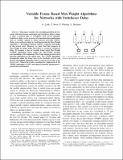Variable frame based Max-Weight algorithms for networks with switchover delay
Author(s)
Celik, Guner Dincer; Borst, S.; Whiting, P.; Modiano, Eytan H.
DownloadModiano_Variable frame.pdf (471.6Kb)
OPEN_ACCESS_POLICY
Open Access Policy
Creative Commons Attribution-Noncommercial-Share Alike
Terms of use
Metadata
Show full item recordAbstract
This paper considers the scheduling problem for networks with interference constraints and switchover delays, where it takes a nonzero time to reconfigure each service schedule. Switchover delay occurs in many telecommunication applications such as satellite, optical or delay tolerant networks (DTNs). Under zero switchover delay it is well known that the Max-Weight algorithm is throughput-optimal without requiring knowledge of the arrival rates. However, we show that this property of Max-Weight no longer holds when there is a nonzero switchover delay. We propose a class of variable frame based Max-Weight (VFMW) algorithms which employ the Max-Weight schedule corresponding to the beginning of the frame during an interval of duration dependent on the queue sizes. The VFMW algorithms dynamically adapt the frame sizes to the stochastic arrivals and provide throughput-optimality without requiring knowledge of the arrival rates. Numerical results regarding the application of the VFMW algorithms to DTN and optical networks demonstrate a good delay performance.
Date issued
2011-07Department
Massachusetts Institute of Technology. Department of Aeronautics and Astronautics; Massachusetts Institute of Technology. Laboratory for Information and Decision SystemsJournal
2011 IEEE International Symposium on Information Theory Proceedings
Publisher
Institute of Electrical and Electronics Engineers
Citation
Celik, G., S. Borst, P. Whiting, and E. Modiano. “Variable frame based Max-Weight algorithms for networks with switchover delay.” In 2011 IEEE International Symposium on Information Theory Proceedings, July 31 2011-Aug. 5 2011, St. Petersburg, pp. 2537-2541. Institute of Electrical and Electronics Engineers, 2011.
Version: Author's final manuscript
ISBN
978-1-4577-0596-0
978-1-4577-0594-6
ISSN
2157-8095